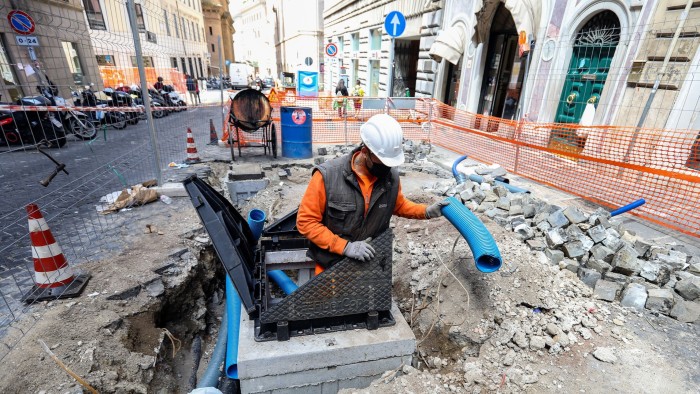Unlock the Editor’s Digest for free
Roula Khalaf, Editor of the FT, selects her favourite stories in this weekly newsletter.
KKR clashed with management over a projected €449mn earnings hole that threatened to derail its plans for the Italian telecoms company it bought last year in Europe’s biggest ever private equity deal.
The US powerhouse has tightened its control over FiberCop, which houses the fixed-line networks business carved out from Telecom Italia in a €22bn deal, after the company’s management presented earnings forecasts that jeopardised billions of euros in prospective dividends.
Last month FiberCop’s chief executive quit after a row with the buyout firm, and all significant decisions by his successor now require prior written approval by one of two executives of KKR’s choosing, according to an internal memo seen by the Financial Times.
The upheaval underscores how much KKR has at stake after triumphing last July in a years-long battle over Telecom Italia with the company’s largest shareholder, Vivendi.
Luigi Ferraris, the former chief executive of Italy’s state-owned railway group, only became chief executive of FiberCop at the time the deal completed last year.
But the board “unanimously” accepted his resignation a week after an explosive board meeting that left KKR scrambling to save face with other investors in the company, including the Abu Dhabi Investment Authority (Adia), the sovereign wealth fund.
At an induction meeting for the new board on January 16, FiberCop’s chief financial officer told investors that management forecast earnings before interest, taxation, depreciation and amortisation would be €449mn lower in 2025 than KKR had estimated in an earlier business plan agreed with the company’s shareholders.
Management put the cumulative ebitda shortfall over five years at €2bn compared with KKR’s original business plan.
The figures were presented to investors — which include Canadian pension fund CPP Investments, Italian fund F2i and the Italian Treasury, alongside Adia and KKR — as part of a draft business plan seen by the FT. CPP Investments and Adia, which own 17.5 per cent of FiberCop each, also pay KKR a management fee.
FiberCop’s management told the meeting that the predicted shortfall in earnings meant that billions of euros in dividends envisaged under the shareholders’ agreement to be paid over the next five years would have to be cut, or else the company would need to raise further public debt and risk a ratings downgrade.
Investors present were incensed, according to multiple people in attendance. Adia’s head of digital infrastructure Mamoun Jamai expressed disbelief, according to others in attendance.
“I cannot believe that after only a few months from the underwriting of a solid due diligence, numbers are off by 20 per cent,” one of the people recalled Jamai having said. Adia declined to comment.
Other investors told the FT that the presentation was merely a “draft” and such discussions were a standard part of the “planning cycle”.
FiberCop is now racing to prepare an updated budget for 2025 before month-end that aligns with the original business plan agreed by the shareholders.
Plans for an expensive early retirement scheme have been put on hold, while other costs have been postponed to 2026 and beyond, according to people with knowledge of the internal discussions.
Management also now forecast that the number of lines they will shed during the year will be lower than previously estimated. Line losses were the largest driver of the shortfall between the original KKR business plan and the one presented at the meeting last month.
However, even as the company readies the 2025 budget, its wider business plan is not now expected to be ready before the summer, the people said.
The shortfall arose because of a litany of factors, according to the management presentation, including households’ slower than expected fibre uptake, a reduction in connectivity revenues, higher labour and IT costs and the cancellation of a €100mn contract with Telecom Italia.
Several people noted that a business carve-out introduced complexities and the highly regulated telecoms industry faced a series of risks that were difficult to anticipate.
For example, many Italians are switching their copper lines to internet infrastructure other than fibre, or opting for other fibre network providers. Because of the country’s geography, it is highly complex to install fibre cables in remote areas.
One person close to the company suggested the highly regulated telecoms industry required specific expertise that Ferraris “realised he lacked”.
The chief executive role has since been handed to FiberCop’s chair, Massimo Sarmi, who was appointed to the board last year by the Italian Treasury.
But an internal memo dated February 17 states that all “operative decisions” must first be approved in writing by one of two executives backed by KKR, including one who currently works for the private equity firm in London and is set to join FiberCop this month.
KKR, CPP Investments and F2i declined to comment. Ferraris did not respond to requests for comment.
Additional reporting by Chloe Cornish in Dubai




